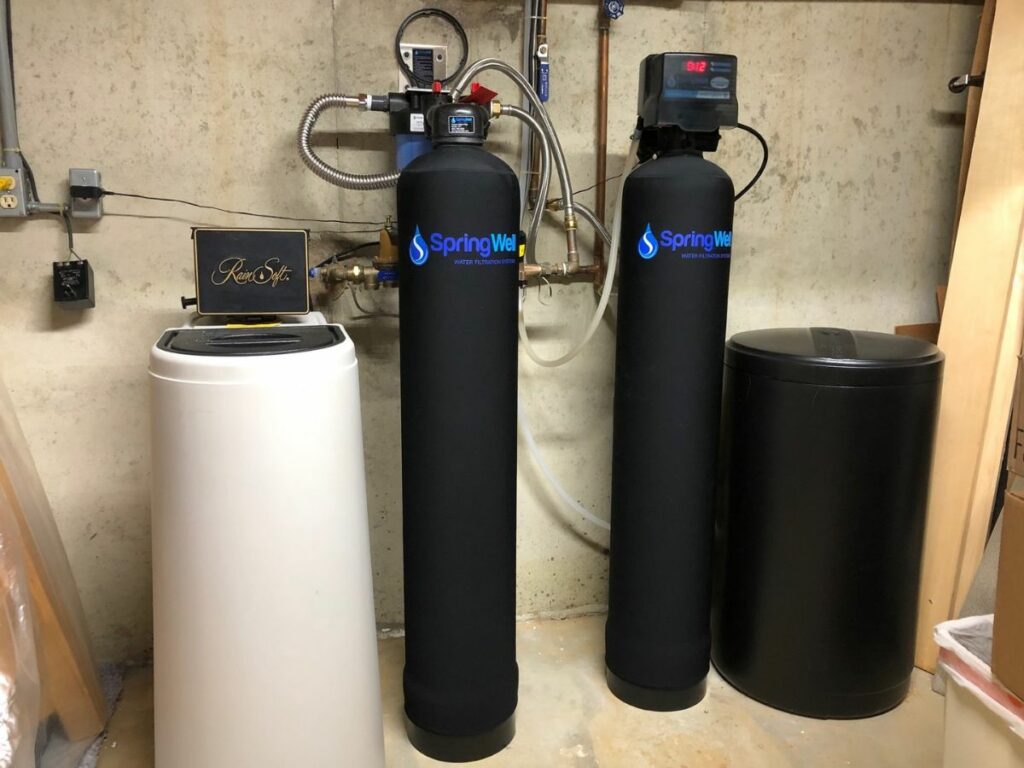Wondering whether your old water softener will suffice, or whether it’s time to consider an upgrade?
In this guide, we’ve shared the 5 signs that a water softener upgrade is due.
📌 Key Takeaways:
- Most water softeners last up to 20 years before they should be replaced.
- You might need to upgrade your softening system if your energy bills are on the rise, you’re noticing the return of hard water effects in your home, or you just want to benefit from a newer, smarter model.
Table of Contents
📈 How Long Do Water Softeners Last?
The average lifespan of a water softener is 10 to 20 years. You can check your user manual or speak to the manufacturer if you’re not sure how long your softener should last.
Once your water softener reaches the end of its predicted lifespan, it’s likely that you’ll start to experience some of the signs we’ve mentioned below.

🤔 Should I Upgrade Water Softener? 5 Signs To Look Out For
Let’s take a look at the top 5 signs that it’s time to upgrade your water softener.
1) You’re Using A Lot Of Salt And Water
If your water bills are rising or you’ve learned how much money you could save if you had a newer, more modern water softening system, it could be time for a water softener upgrade.
Old softeners waste more water and salt than newer systems, which save salt and water by predicting exactly when to regenerate based on your water usage and hardness (demand regeneration).
A new water softener can help you save money because you won’t have to top up the salt levels as frequently and the system will only regenerate when absolutely necessary.
2) Your Soft Water Production Is Inconsistent
Old water softeners begin to lose their ability to properly soften water, which means that you may have water that’s only partially soft in your home. In this case, you’ll start to notice the effects of hard water that your softener was previously preventing, including soap scum and mineral build-up. According to United States Geological Survey, “When using hard water, you may have a harder time working your soap into a lather and you may need to use more water to rinse the scum from your hands.”
Or, the resin may have degraded and lost some of its capacity, meaning that it runs out of sodium ions before the water softener regenerates. As a result, you’ll have periods of hard water, followed by soft water, then hard water again, and so on.
Upgrading to a new softener means you’ll always have softened water because you’ll have a high-capacity resin that’s fresh and produces the most effective results.

3) Your Water Consumption Has Changed
If your children have flown the nest or you’ve welcomed new additions to your family, you may need to upgrade your water softener to a suitable size for your current living situation.
A water softener will only work well when it serves the right-sized household for its softening capacity. If your water usage changes substantially, your water softener won’t be able to perform efficiently for your needs.
You can make sure that a new softener is tailored to your new soft water requirements, and even upgrade from one tank to two tanks.
4) You Need To Make An Expensive Repair
An old water softener will have experienced years of wear and tear, which could result in permanent damage to the brine or resin tank, valves, or control head.
Oftentimes, the cost of repairing or replacing these components is high, especially in old systems, since the parts are probably no longer widely available.
In many scenarios, it makes more sense to install a new water softener than it would to continue to fix an old unit that probably only has a few years of life left.

5) You Want A Smarter Upgrade
Sometimes, there may be no physical signs that your old water softener is ready to call it a day. But you might personally want to upgrade to a smarter system that has a few convenient benefits, including the ability to connect the system to an app on your phone, allowing you to receive automatic service notifications and monitor its performance remotely.
App connectivity is only one of the benefits of a smart water softener. New softening systems may also have features like low-salt indicators, demand-initiated regeneration, and a space-saving design, making maintenance easier and further boosting performance.
If you just feel that your softener is outdated and you’re ready to purchase a system that’s in line with the times, it may be time to upgrade.
Related content:
- Upgrade to the Best Water Softener: Our Ultimate Guide
- Water Softener Maintenance 101: How to Troubleshoot 17 Common Problems
- Water Softener Resin: Lifespan and Replacement Guide
- Why Your Water Softener is Consuming More Salt Than Necessary
- Get the lowdown: electric vs non electric water softener systems
📑 Final Word
Reduced softening abilities, a change in your water consumption, expensive repairs, and your own desire for a smarter model are all signs that you need to upgrade your water softening system.
New softeners are superior to the existing models, but that doesn’t mean they’re all worth your money. Make sure to shop around and choose a unit that’s right for your budget and softening needs.

